photo.circle 2019 – recap
2019 has been a busy and inspired year of growing together as a community! THANK YOU, everyone, for being a part of this journey. We are looking forward to seeing more of all of you in 2020!

JANUARY: 2019 started with Nepal Picture Library being invited to showcase work at the India Art Fair, New Delhi. Photo: Shikhar Bhattarai

JANUARY: The Lightning Testimonies by Amar Kanwar opened in October 2018 at Photo Kathmandu and remained on view at Chhaya Center, Thamel until March 2019. This extended viewing allowed for public programming that created a wide range of interactions on the issue of sexual violence with diverse publics that included school and college students, art, law, journalism and social-work students, educators, journalists and other media professionals, artists and filmmakers, theatre practitioners, researchers, activists, policy makers and the general public. The artist, Amar Kanwar, participated in several talks and discussions. This allowed for a series of interactions which became great opportunities, especially for young Nepali artists to learn about his practice in an in-depth way.
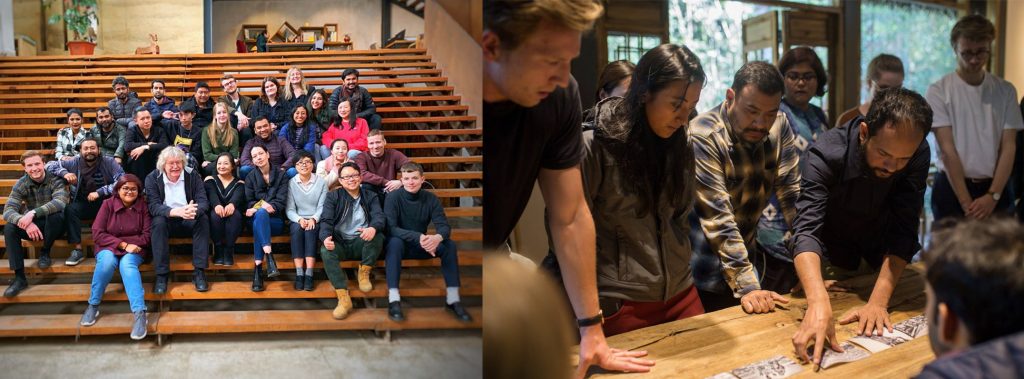
FEBRUARY: 4 Nepali photographers participated in the International Storytelling Workshop in China. Shradha Devkota, Sabrina Dangol, Rohan Bataju, and Karma Tshering Gurung spent 45 days in Kunming alongside students from OsloMet Fotojournalistikk – Norway, Pathshala South Asian Media Institute – Bangladesh, and Mino Art Center – China. Each of them produced work that has now been included in a new book and exhibitions in Norway and China. Photo: Mino Art Center

FEBRUARY: Ayushma Regmi, an independent educator and LGBTIQ activist, designed and conducted a 3-day workshop titled “Teaching Histories at The Lighting Testimonies”. It was attended by 20 social studies teachers from 12 different schools in Kathmandu. About the workshop experience, Ayushma writes; “The Lightning Testimonies has been an experience in disruption. It does not allow the viewer to sit comfortably in their own patterns of viewing linearly, chronologically, rationally. There is no system or structure to experiencing it. And so, we are thrown uncomfortably out of life-long habits of consuming the moving picture. The task, then, becomes to watch ourselves, and our unease, as much as what is laid out there in front of us. And then, to delve into a chaotic, disorderly way of viewing, listening, receiving, and participating. It requires spontaneity and improvisation. An agility of the mind and a willingness of the spirit to bend in previously unknown dimensions. It was with the intent of destabilizing history as a subject that we set out to conduct a workshop with secondary school social science teachers from private schools in the Kathmandu Valley earlier this February. The main idea was to help teachers to understand history not as a singular, linear narrative composed cleanly and clearly of reliable facts and timelines.”
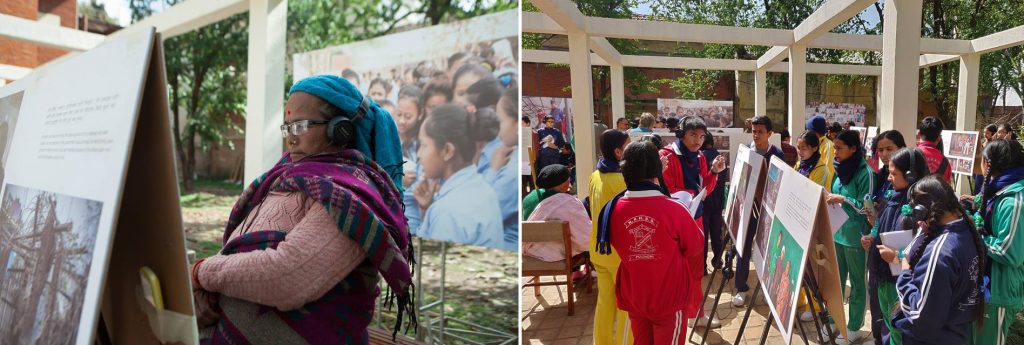
FEBRUARY: In partnership with Conflict Victims Common Platform, photo.circle produced “14 Stories: Living Memories of War” an exhibition of photo stories by photographer Kishor Sharma of civilians living with conflict-related disabilities. These stories are the living histories of the decade-long armed conflict. After traveling to the home districts of all 14 survivors featured in the exhibition in 2018, the exhibition arrived in Kathmandu for the final show in February 2019. The exhibition was accompanied by public programming that included discussions, film screenings, and workshops in collaboration with different organizations. Photos: Tripty Pakhrin

FEBRUARY: A one-day workshop for performance artists was conducted in collaboration with Zubaan Books and Panos South Asia. The workshop opened with the viewing of The Lightning Testimonies. The viewing set the agenda for the first half of the workshop; to think about issues in the representation (particularly visual) of sexual violence and consider how we may break away from familiar tropes of representation. Participants identified common stereotypes through which sexual violence is visually depicted. They shared their observations on how several misconceptions about sexual violence are perpetuated through prevalent representational practices—for instance, about the nature of perpetrators and victims (concerning their age and other profiles), common locations and timing in which rape scenes are portrayed, the physical nature of the violence, the absence of women’s agency, the performance of silence or definite ruination, and so on. During this conversation, we tried to get participants to think not only about how problematic these representations are but also about how these specific modes of representation relate to actual ways in which we understand and adjudicate sexual violence, both culturally and legally. How would alternative representational strategies foster different understandings? One key takeaway from this discussion was what the insufficiencies of representational practices may have to do with the lack of vocabulary on sexual violence in our languages. How can that vocabulary be generated—especially with performance in mind?

FEBRUARY: Shikhar Bhattarai represented photo.circle at the Yangon Photo Festival and presented 2 Nepali photo projects. Photo: Shikhar Bhattarai
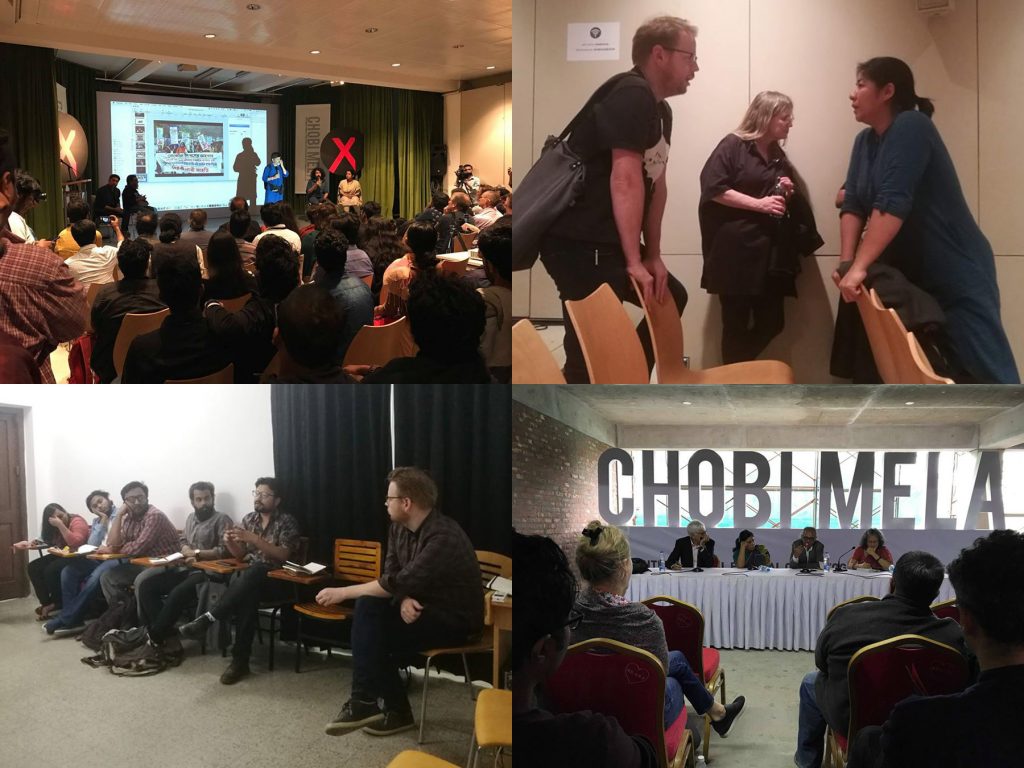
FEBRUARY: Team PC traveled to Dhaka for the 10th edition of Chobi Mela International Photography Festival. Chobi Mela has been a bi- annual pilgrimage for many of us where we meet old friends, reflect on on-going programs, discuss future plans, present work, make new friends. Photo: Sagar Chhetri

FEBRUARY: Many groups across professions visited The Lightning Testimonies. Among them, in February, members of the National Human Rights Commission, including previous commissioner Mohna Ansari, visit the exhibition.
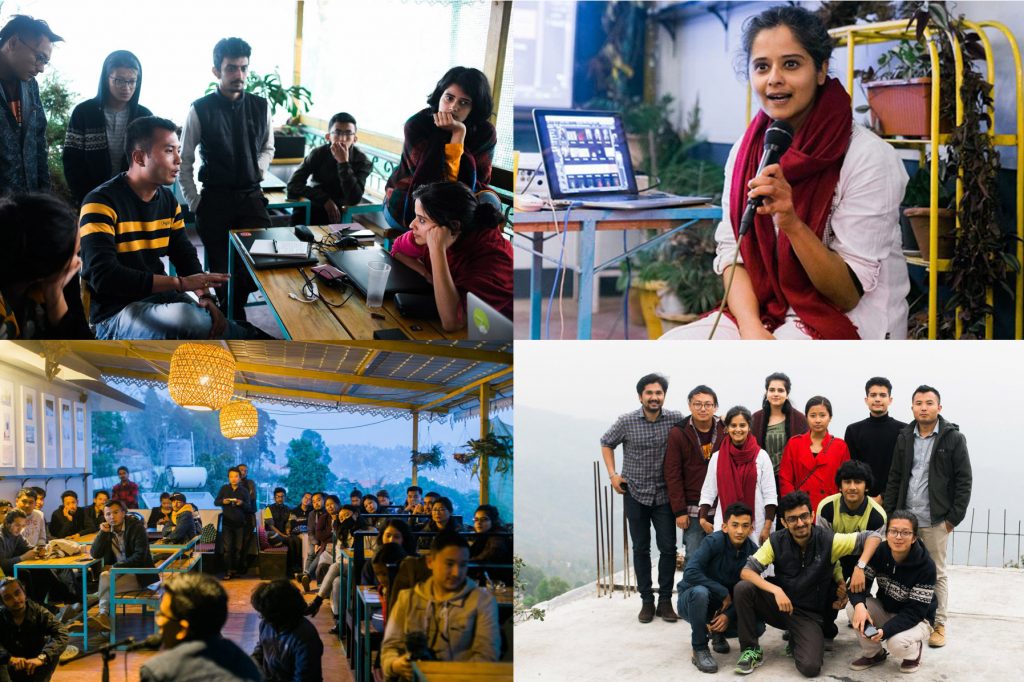
MARCH: Bunu Dhungana and Sagar Chhetri traveled to Kalimpong, India to facilitate a week-long visual storytelling workshop. At the end of the workshop, they put together a pop-up exhibition and a slideshow presentation of all the works produced. Bunu and Sagar both practicing photographers themselves, also presented their personal works to a local audience in Kalimpong. The workshop was organized in collaboration with Focus Kalimpong. Photo: Ashwin Sharma

MARCH: Members of the Nepal Bar Council visit The Lightning Testimonies. Screening was followed by discussions on the challenges of dealing with sexual violence within the current Nepali justice system.

MARCH: Several student groups visited The Lightning Testimonies and each screening would be followed by discussions. This was a discussion session with students from Kathmandu University School of Law on justice and impunity in relation to sexual violence facilitated by Prakritee Yonzon (KU School of Law faculty) and NayanTara. Student groups from National Law College and Nepal Law
Campus also visited the exhibition at various points for viewings and discussions.

MARCH: Uma Bista’s exhibition “Our Songs from the Forest” opened at Chhaya Center, Thamel. This exhibition was a tender solicitation, into the hills of Achham, where we get to met a chorus of young women coming of age in a fast-changing society. These young women are learning how to navigate severely oppressive cultural practices alongside new aspirations of equality. The exhibition was curated by NayanTara Gurung Kakshapati and produced by photo.circle in collaboration with the British Council Nepal through its Connecting Classrooms and Rivers of the World program.

MARCH: Manisha Nath (16) and Tejana Khanal (18) from Achham, who were both part of Uma Bista’s exhibition, came to Kathmandu and taught a workshop on how to use a menstrual cup. Tejana and Manisha are both trainers with The Rato Baltin Project and conduct workshops on menstrual health in Achham regularly. The workshop was followed by a discussion on Chhaupadi as a cultural practice and the challenges in implementing the new criminal code. The discusssion was conducted by photographer Uma Bista and Nayantara Gurung Kakshapati from photo.circle along with Manisha Nath and Tejana Khanal. Clara Garcia Ortés, founder and project manager of Rato Baltin Project and Pashupati Kunwar, project advisor, also shared updates from the ground. Photos: Tripty Pakhrin
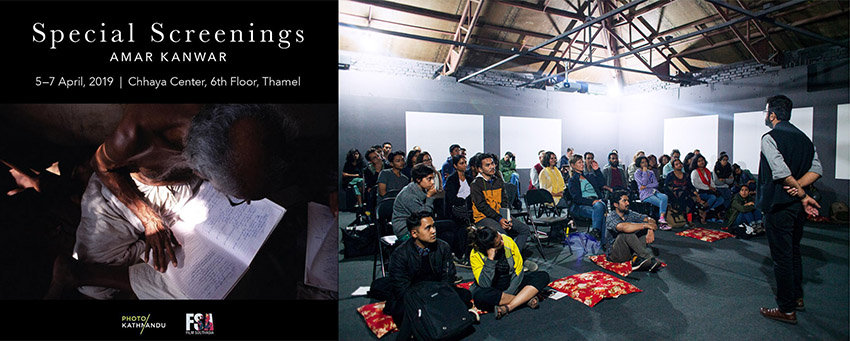
APRIL: As a way to wrap up the 6 month showcasing of The Lightning Testimonies, we were honored to organize a special weekend of screenings of films by award-winning artist Amar Kanwar. This was a rare opportunity to view this range of works by one of South Asia’s most respected artists of our times, and was underscored further by the fact that he was present through the weekend at the screenings engaging with the audience. The screenings were in collaboration with Film Southasia. Photo: Sagar Chhetri

APRIL: The photo.circle team with artist Amar Kanwar, all still smiling after the end of a year long engagement of planning, installing, showcasing and activating The Lightning Testimonies in Kathmandu.
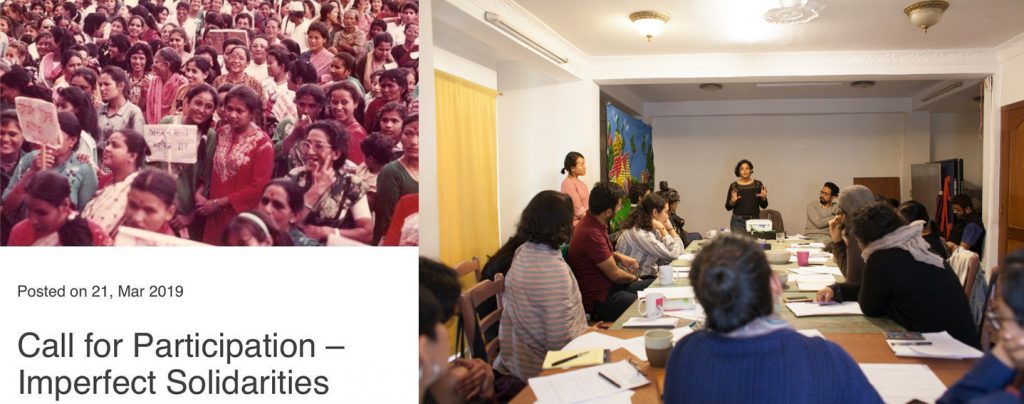
APRIL: We kicked off the Imperfect Solidarities seminar series in April 2019, as an inquiry into the intricate and imperfect workings of solidarity building and collective action within the feminist, women’s and other movements in Nepal. The series was specially conceived as a response to an invitation to collaborate in the Curriculum of Studies into Darkness by artist Amar Kanwar. Each “exploration” as we have been calling the seminars, has offered participants a unique opportunity to engage with peers; activists, artists, educators, journalists, lawyers, policy makers and others who have shaped, participated in and made pivotal contributions to various movements and campaigns across issues. The curricular paradigm has been exploratory – and not geared towards teaching. The intent has been to create space for difficult conversations. Imperfect Solidarities has been co-facilitated by Prathama Raghavan and NayanTara Gurung Kakshapati.

kickass group of Nepali feminists – writers, researchers, activists, educators journalists and artists who are all doing amazing work here in Nepal. It came together as a last minute thing – sorry we could not invite more of you! Next time! Photo: NayanTara Gurung Kakshapati

APRIL: We launched Counter Culture Nepal as a new platform that creates space online for conversations around gender, sexuality, patriarchy, power and violence.
Follow and join the conversation here: https://www.instagram.com/counterculturenepal/
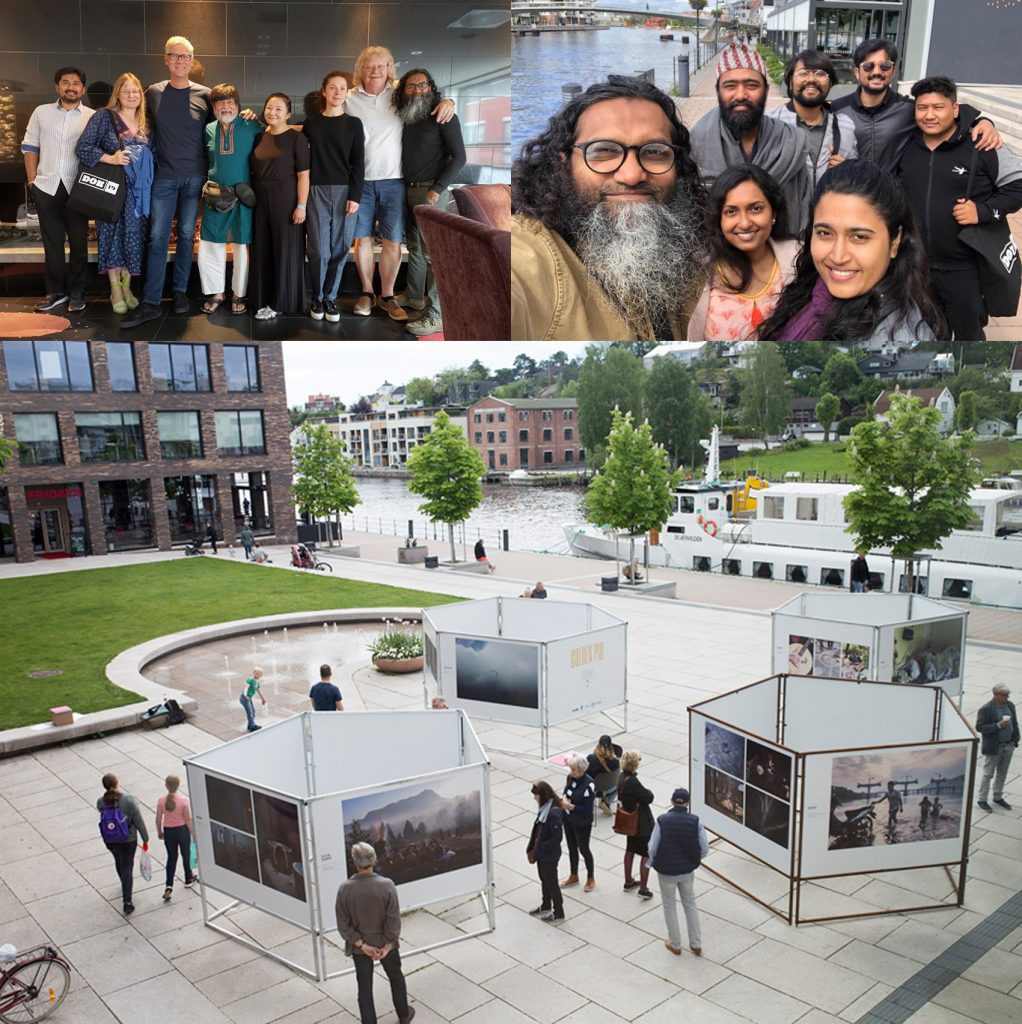
MAY: As part of our ongoing cooperation with Oslo Metropolitan University and the DOK festival, Norway, 2 Nepali photographers Karma Tshering Gurung and Sagar Chhetri travelled to Norway to represent photo.circle and participate in DOK Photo Festival 2019. Karma and Sagar attended various talks, presentations and exhibition openings during their visit to the festival. They also had meetings with partners, friends and various photographers from around the globe. DOK Festival also had a group exhibit and a book launch that featured the works produced during the International Documentary Workshop 2019 in China. Photo essays by 4 Nepali photographers, Karma Tshering Gurung, Sabrina Dangol, Rohan Bataju, and Shradha Devkota, along with their 16 counter-parts from Bangladesh, China and Norway was also part of the showcase.

MAY: The Feminist Memory project was exhibited at Thames International College as part of the school’s Social Work Symposium 2019.

MAY: One of our favorite workshops, our regular Introduction to Storytelling Workshop had a cohort of 11 young Nepali photographers for the Spring 2019 batch. They worked on individual photo stories/projects during the course of this two-week workshop. On the final day, all 9 photo essays were presented to a public audience at Base Camp, Jhamsikhel.

MAY: A new bundle on the block! Shuntu’s little brother Pushpayug joined the PC family!
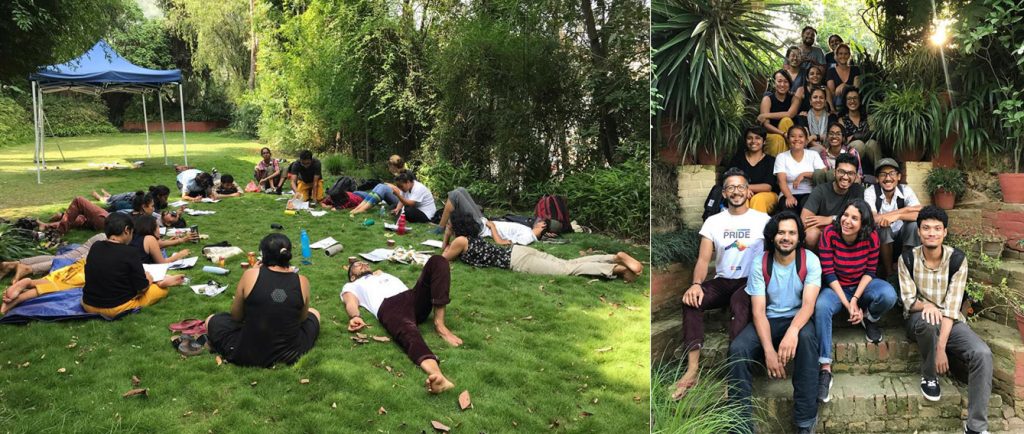
JUNE: The 5th exploration of Imperfect Solidarities was on “Learning from the Natural World”. What if we learnt from other inhabitants of this planet, some of the oldest and wisest? What if trees and forests were our teachers? What would we learn? What would we do differently? This exploration was based on select chapters on Friendships, Social Security, Forest Etiquette, Hibernation, Burnout and others from Peter Wohlleben’s incredible book “The Hidden Life of Trees”. What can the interconnectedness of all forest inhabitants teach us about building community and taking care of each other? The exploration took place in Dhulikhel on a beautiful summer day.
Follow Imperfect Solidarities: https://www.instagram.com/imperfect.solidarities/

JULY: A new project was launched at Nepal Picture Library called “Indigenous Pasts, Sustainable Futures” with kind support from the Prince Claus Fund. This project is a part of NPL’s ongoing endeavor to document, archive and present Nepal’s marginalized histories. As with our other projects, we are looking for innovative ways to engage with our pasts. For this project, we began to explore traditional knowledge systems, design and material cultures, as well as a diverse selection of material objects, to examine indigenous forms of conservation and sustainability. Our goal has been to archive indigenous pasts by exploring material objects as primary witnesses to history.

JULY: Shikhar took a sabbatical and went sky diving!
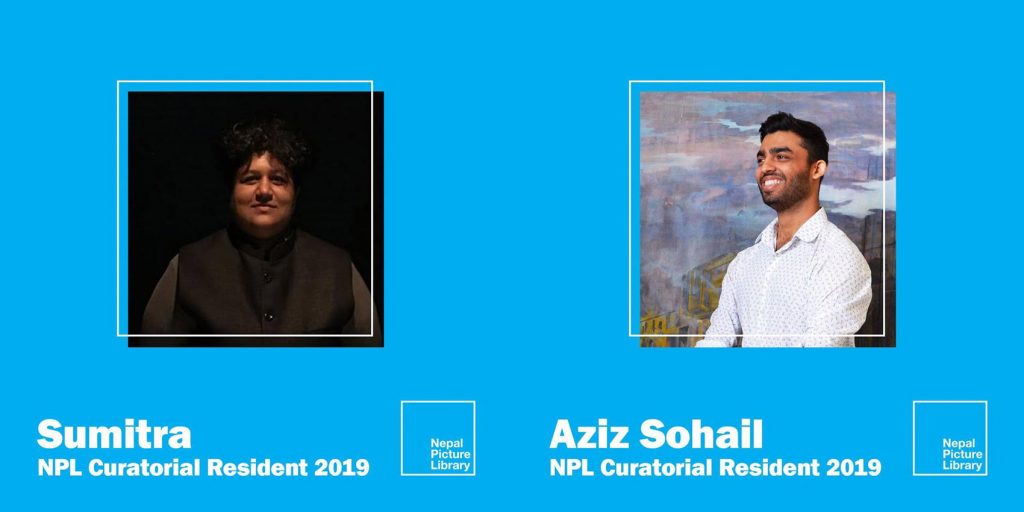
JULY: Nepal Picture Library was pleased to invite Sumitra Sundar (India) and Aziz Sohail (Pakistan) for a summer Curatorial Residency to research the promise and potential of ‘queer archives’ in South Asia.

AUGUST: Mid-way through their summer residency, Sumitra and Aziz presented a one-day discussion seminar to collectively think about queer archives, art practice, and activism through conversations on how, as curators, researchers, archivists, educators, and activists, we can remember, recognize, and witness queer lives across South Asia. Photo: Sagar Chhetri

AUGUST: In collaboration with Film Foundry and Siddhartha Art-Gallery, we organized an Artist Talk by Belgian photographer Brigitte Grignet.

AUGUST: Team PC traveled to Dali, China to present the works of Kishor Sharma, Bunu Dhungana, Nepal Picture Library, Uma Bista & Sagar Chhetri at the Dali International Photography Festival. The festival also hosted the outcomes of the International Storytelling Workshop 2019 by 20 students from Bangladesh, China, Norway, and Nepal which included works of Shradha Devkota, Sabrina Dangol, Karma Tshering Gurung and Rohan Bataju from Kathmandu.
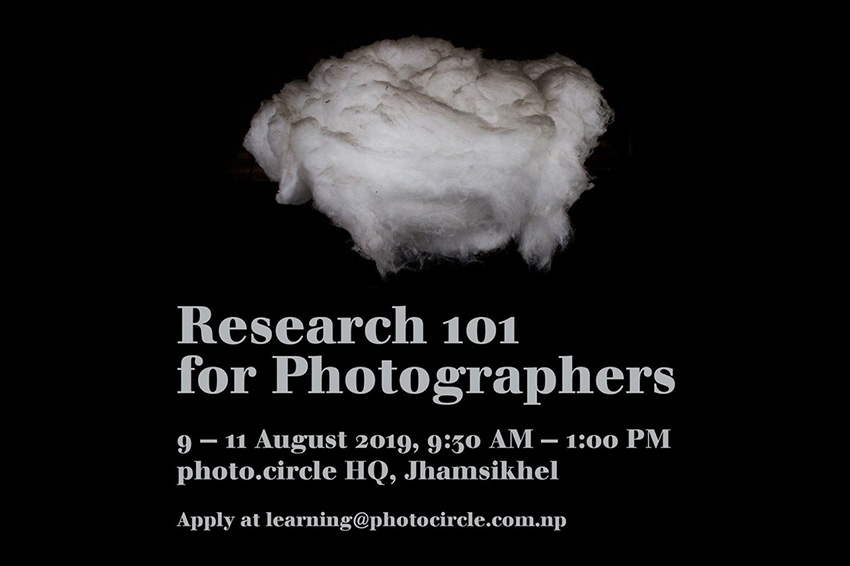
AUGUST: “What role does research play in your photography and art practice? What are the different ways research can be done?” This 3-day workshop was designed for intermediate and advanced photographers and lens-based practitioners to introduce them to research concepts and methodologies. Participants were asked to come with a project idea that they will begin to research and develop during the workshop period. The workshop was led by Sumitra Sunder, a Bangalore based independent art curator and researcher with inputs from Diwas Raja Kc, Head of Research at NPL and NayanTara.

AUGUST: Tripty Pakhrin was awarded The Alexandra Boulat Grant in remembrance of the late, prize-winning French photographer.
The grant enabled Tripty to study at the Danish School of Media & Journalism in Aarhus, Denmark this year as part of their Photo I program. Tripty became the 5th Nepali photographer to join this program in the last 7 years.

AUGUST: Exploration 7 of Imperfect Solidarities was centered on memory, memorials and memorialization and initiated conversations on the need for a broader imagination in terms of who, what, why and how we want to remember, the complexities of pain and the dangers of absolute positions. “How can we find a way to deal with different versions of history? How can we deal with different groups of people pushing for their own versions? In the spirit of Imperfect Solidarities, we discussed whether it is possible to create participatory, collaborative and collective processes, spaces and sites to memorialize, and what all this says about not only our past, but also our future, and about who we want to say we are.
Follow Imperfect Solidarities: https://www.instagram.com/imperfect.solidarities/

SEPTEMBER: NayanTara traveled to Melbourne to partake in a series of meetings, seminars and presentations hosted by RMIT University on themes around photography, civic engagement, and public histories. Photo: Shikhar Bhattarai

SEPTEMBER: Sagar was awarded a Visiting Artist Fellowship at The Lakshmi Mittal and Family South Asia Institute at Harvard University in Massachusetts. He spent 8 weeks at Harvard where he audited two courses, one with Prof. Dr. Sugata Bose on “Colonial and Post-Colonial Histories of South Asia” and another ‘Critical Theory: Identity, politics and Representation’ with Dr. Houman Harouni at the Harvard Graduate School of Education. The fellowship also gave Sagar the opportunity to meet with various Harvard affiliates, faculty members, and other fellows, attend seminars, visit various libraries and explore various archives related to his research topic of racial/social identity, marginalized voices across South Asia, and the history of the Indo-Nepal border. Sagar got to attend lectures by amazing people like Dr. Amartya Sen, Prof. Teju Cole, Prof. Marshall Ganz, among others. As part of the fellowship, Sagar exhibited his work “Eclipse” at the Mittal Institute. He was also invited by the Center for Contemporary South Asia at the Watson Institute, Brown University to present his work and speak at a seminar titled “Poetry and Photography as Radical Storytelling: How do we express identity in a political landscape?”. Photo: Sneha Shrestha
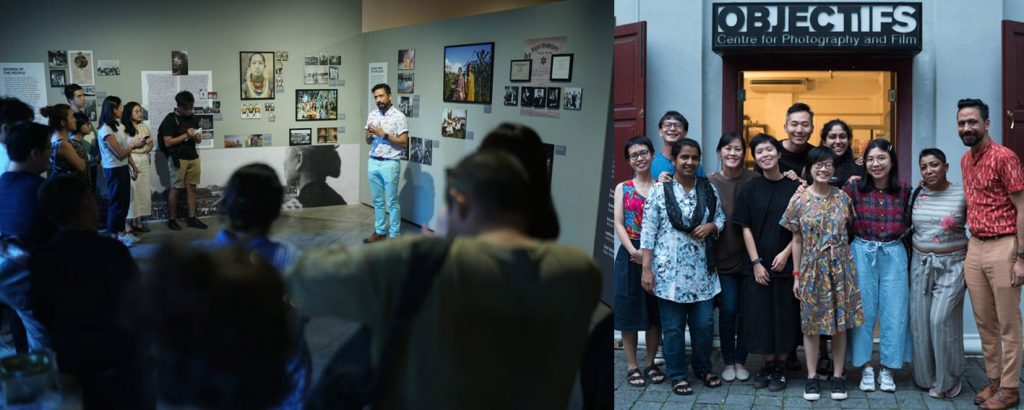
OCTOBER: The Feminist Memory Project was shown at the Objectifs Center for Photography and Film. Nepal Picture Library’s Head of Research Diwas Raja KC traveled to Singapore to present the exhibition and speak about NPL’s public history work. Photos: Objectifs Center for Photography and Film
More about Objectifs Center for Photography and Film: https://www.objectifs.com.sg/

OCTOBER: Explorations 8 and 9 of Imperfect Solidarities addressed Shame, Stigma, Vulnerability, Accountability, Transformative Justice and Healing.
In past explorations, ‘shame’ had come up as a strategy that has been used to uphold dominant discourses of all kinds. What role does shame play in our lives, in our movements, in our allyship? What does shame, stigma and humiliation come in the way of? What of vulnerability? For this exploration, we used talks, interviews, and activities to help us delve into discussing shame, stigma and humiliation. We shared stories and explored alternative responses that exist, and that we imagined. Expanding our notions of vulnerability in our lives and movements, we attempted to collectively imagine new ways of coming together, of standing up to injustice, and moving forward.
When established justice systems and processes do not enable justice, do not enable healing, and sometimes, cause even more harm, when a choice is made to not approach traditional justice systems – what alternative forms of justice are possible? What would enable healing? How do we centre survivor experiences in this process? How do we engage with accountability of the person who used violence, abused power? What would that accountability look like?
For this exploration, we discussed recent and past examples in our collective histories of alternative justice systems. We read, listened to, conversed to discover, learn and unlearn justice and healing.

NOVEMBER: Rohan Bataju was announced the recipient of the 2nd Frit Ord Grant for his new proposed project “Left Behind”, that documents women in Nepali villages affected by mass out-migration. The project aims to explore how women tackle social stigma and loneliness every day, how social structures and dynamics evolve over time, and the role that the community plays. Rohan will receive 20,000 NOK to complete this project through 2020. The project will be exhibited at DOK Festival 2021 in Fredrikstad, Norway.

NOVEMBER: We announced dates for Photo Ktm 2020! Mark your calendars and see you in December 2020 folks!
Follow PhotoKTM updates: http://www.photoktm.com/save-the-dates/

NOVEMBER: Shristi attended the South Asia Safety Summit in New Delhi organized by Facebook who we are partnering with for our Counter Culture Nepal initiative. Follow CCN here: https://www.instagram.com/counterculturenepal/

NOVEMBER: We kickstarted the second phase of research for the Feminist Memory Project at the Women of the World Festival in Janakpur, Dhanusha. The second phase of FMP will focus on looking at the history of the feminist and women’s movement in the Madhes.
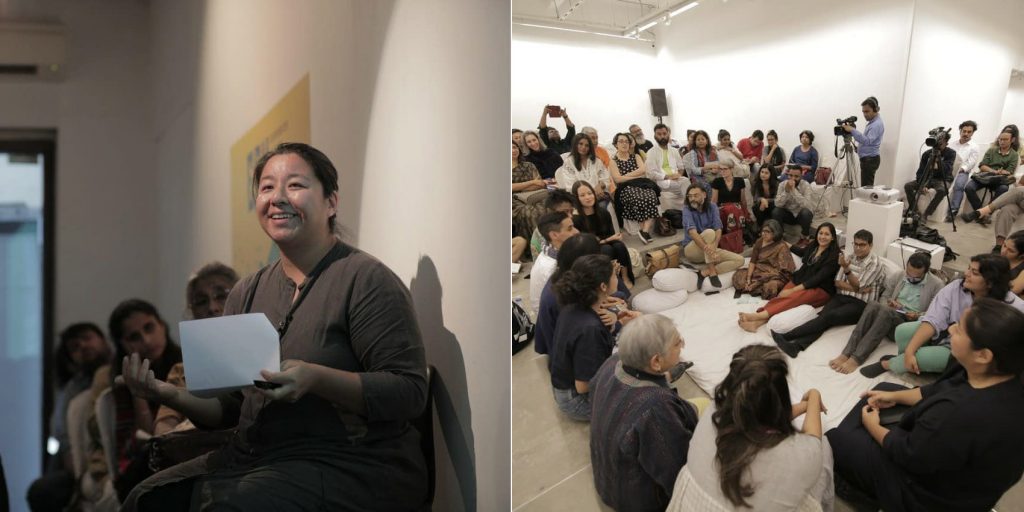
NOVEMBER: NayanTara was invited to present at the Experimenter Curators’ Hub – an annual coming together of 10 curators from around the world at Experimenter Gallery in Kolkata to discuss debate and converse about curatorial practice. Photo: Courtesy Experimenter
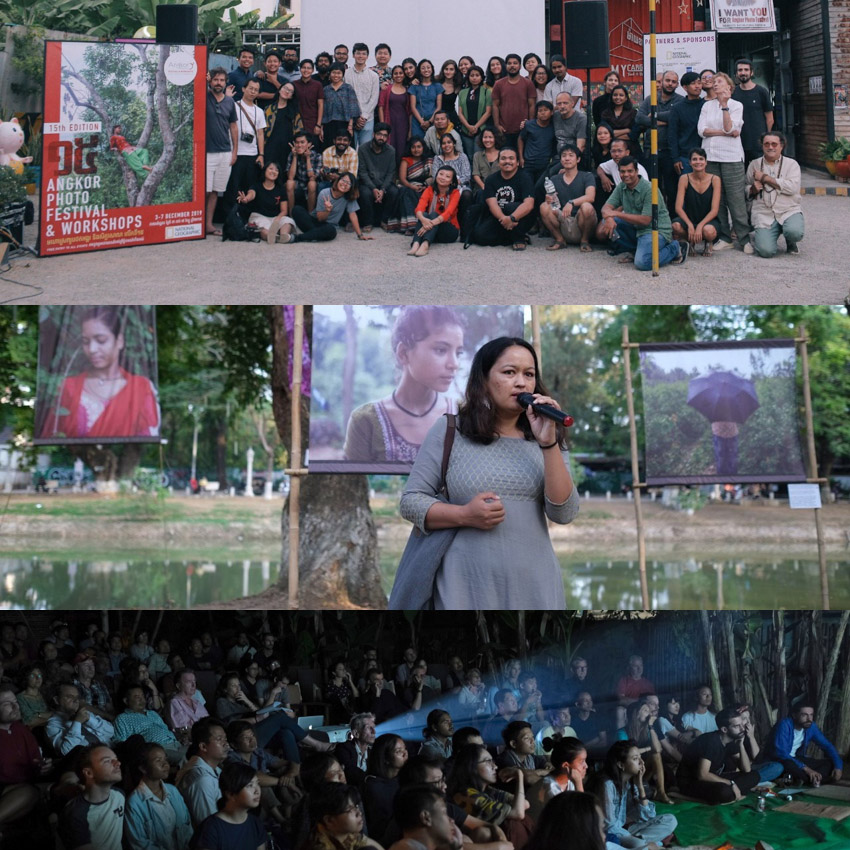
DECEMBER: Team PC attended the 15th edition of Angkor Photo Festival in Siem Reap, Cambodia. Shraddha and Sabrina participated in Workshops. Uma’s work “Our Songs from the Forest” was exhibited and NayanTara presented a curated slideshow titled “How We Remember”. Photo: Courtesy Angkor Photo Festival
More about Angkor Photo Festival: https://angkor-photo.com/
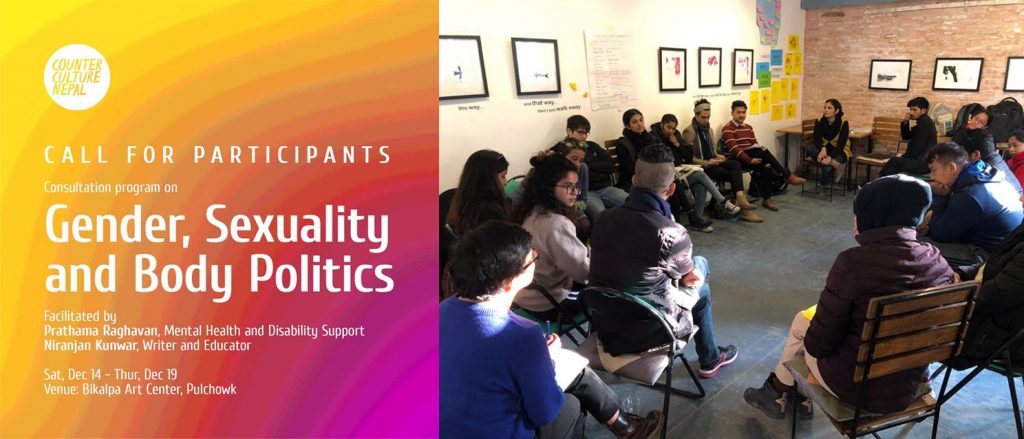
DECEMBER: Counter Culture Nepal organized a six-day consultation program designed to deepen our understanding of gender, sexuality and body politics and how these ideas are connected to social justice and violence. The consultation included a diverse group of participants who shared and learned from each other. The consultation was developed and facilitated by Prathama Raghavan who is a Mental Health and Disability Support professional and Niranjan Kunwar who is a Writer and Educator.
Follow CCN: https://www.instagram.com/counterculturenepal/

DECEMBER: As part of Counter Culture Nepal’s series of off-line events, we presented a live episode of Boju Bajai at Thames International College. Boju Bajai is a monthly podcast produced and presented by Bhrikuti Rai and Itisha Giri. For this live episode, Itisha and Bhrikuti took us on a musical journey through love, romance, courtship, and consent, as presented in Nepal’s popular culture. Boju Bajai tries to facilitate a dialogue around gender, sexuality in relation to Nepal’s media and popular culture. Photo: Samagra Shah
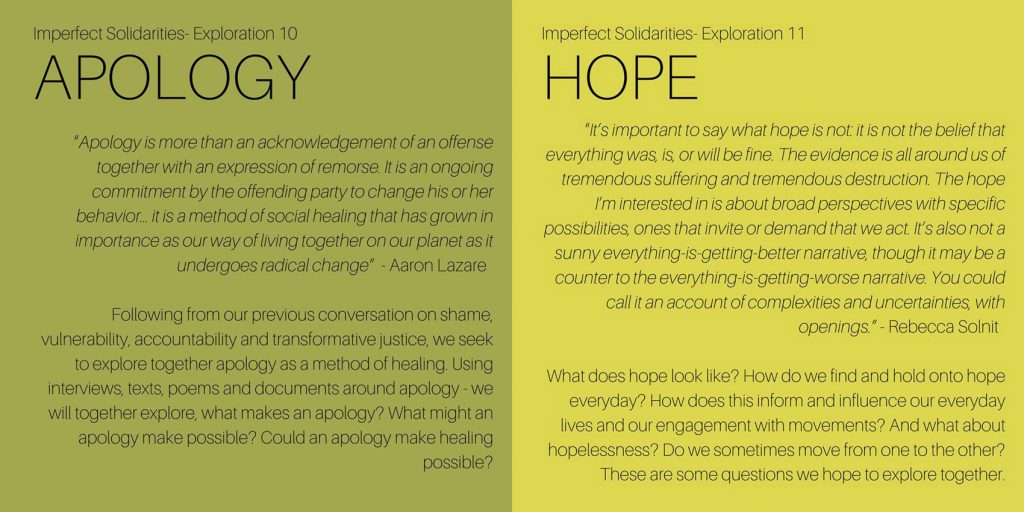
DECEMBER: We wrapped up this first series of Imperfect Solidarities with two explorations on APOLOGY and HOPE.
Finally, we would like to wrap up the year with a message of solidarity and hope;
Through 2019, we have gathered once a month here in Kathmandu, to think and converse around the idea of Imperfect Solidarities. Last weekend, we assembled one last time for this year, to read, listen, and reflect together, and decided to put out this message of solidarity and hope;
To people coming together, to resist, to raise their voice, to stand their ground, in a variety of ways, some visible and others (made to be) less visible, in Hyderabad, in Guwahati, in Srinagar, in Nehtaur, in Mangalore, in Kolkata, in Dibrugarh, in Bangalore, in Muzaffarnagar, in Kurnool, in Lucknow, in New Delhi and cities and towns across the region, we see you, we hear you, and we celebrate your courage and your hope;
We see you come together, across boundaries and differences, questioning and standing up to power, denouncing violence, refusing to be pitted up against each other. We see your commitment to collectivity, sisterhood, your commitment to creating space for voices less heard. We see women and other minorities at the forefront. We see young people, old people, people across religious, caste and class hierarchies. We see how you are using social media to inform, amplify, mobilize and inspire. We see you invoke the power of poetry, song and imagination. We see you call each other up, hold each other accountable, mobilize, reach into your pockets, be resourceful, show up, rest, show up again. We see you call on old solidarities, movements, networks, and build new ones. We see you sometimes waver, change your mind, shift, adjust. We see you persist, in imperfect solidarities, despite and perhaps because of these imperfections, because there is more to be done.
We are watching, listening and learning. We send you courage. We stand with you in solidarity and in hope.
Kathmandu, December 2019
